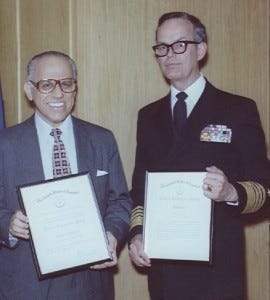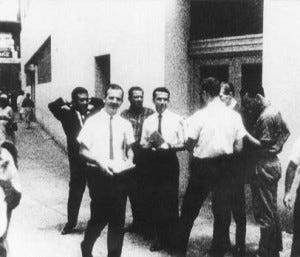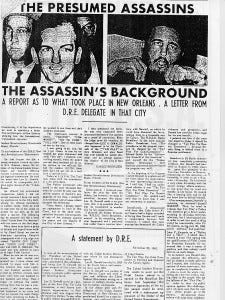CIA Admits Undercover Officer Lived in New Orleans
FOIA lawsuit elicits new details about surveillance of Lee Harvey Oswald
George Joannides, chief of CIA covert operations in Miami in 1963, also had a residence in New Orleans, according to the CIA.
In a court motion filed last week, the CIA acknowledged for the first time that deceased CIA officer George Joannides lived in New Orleans while handling contacts with an anti-Castro student organization whose members had a series of encounters with accused presidential assassin Lee Oswald in August 1963.
The unexpected admission came in arguments before a federal court judge about whether the CIA is obliged to pay $295,000 in legal fees incurred during my Freedom of Information Act lawsuit concerning certain 50-year-old JFK assassination records. In a previous court filing, my attorney Jim Lesar argued that two documents released over CIA objections in 2008 were significant because they showed that Joannides's espionage assignment took him to New Orleans where Oswald lived.
In a 38-page response U.S. Attorney Ron Machen disputed the claim that Joannides had traveled to New Orleans in the spring of 1964 at the time Warren Commission was investigating Oswald's contacts with anti-Castro Cubans. Machen said the documents showed only that Joannides had maintained a residence in New Orleans. U.S Attorney Ron Machen.
"New Orleans is clearly listed as Joannides' place of residence when on home leave, and the form does not put him in New Orleans on the dates cited by Plaintiff," Machen stated.
Joannides and his family lived in Miami from 1962-64, according to CIA records and interviews with former colleagues. Joannides's residence on 65th Avenue in Southwest Miami was listed in the 1963 Miami phone book.
Machen's filing did not disclose why Joannides maintained a second residence in New Orleans. Whatever the date of Joannides's travel to New Orleans, Machen's motion confirms that Joannides lived in the Crescent City at same time, or shortly after, the anti-Castro student group under his control had contact with Kennedy's accused killer.
The admission is significant because Joannides's financial support for Oswald's antagonists among the anti-Castro exiles was not disclosed to the Warren Commission.
Former commission staffer Burt Griffin, now a judge in Ohio, recently told AP reporter David Porter that the CIA's failure to disclose Joannides's actions in 1963 was an act of "bad faith."
Joannides, who died in 1990, was never questioned by JFK investigators about contacts between the anti-Castro students he supported and Kennedy's accused killer.
CIA in New Orleans
Joannides is one of the most significant new characters to emerge in the always controversial story of JFK's assassination. The New York Times, the Washington Post, and the Associated Press have all reported in recent years on the unusual secrecy around his role in the events of 1963.
As an undercover CIA officer living in New Orleans, Joannides was well positioned to report on Oswald's actions in late 1963. Using the alias "Howard," Joannides served as case officer for the Cuban Student Directorate (DRE), the anti-Castro organizations funded by the agency that publicized Oswald's pro-Castro ways both before and after JFK was killed.
Joannides also served as chief of the psychological warfare operations branch of the CIA's Miami station, according to declassified CIA records. The CIA had an office in New Orleans where Oswald, an itinerant ex-Marine married to a Russian woman, lived from April to September 1963.
Lee Oswald came to the attention of CIA-funded anti-Castro exiles in New Orleans in the summer of 1963. In August 1963, Oswald had a series of encounters with members of the New Orleans chapter of the Cuban Student Directorate who challenged his public support of Cuban president Fidel Castro.
The Cuban students publicized and denounced Oswald's pro-Castro activities on a local radio program. They sent one member, described as an "intelligence officer," to visit Oswald's house posing as a Castro supporter, to learn more about him. The group issued a press release on August 21, 1963, calling for a congressional investigation of Oswald, who had not shot anyone at that point.
At the time, the CIA, via Joannides, supplied the Cuban students in Miami with $51,000 a month, according to CIA memo found in the JFK Library in Boston. The group's activities involved "propaganda, political action and intelligence collection," according to Joannides's fitness evaluation from the summer of 1963. When it came to Oswald, the DRE delivered what the CIA paid for.
The First Conspiracy Theory
Within an hour of Oswald's arrest for killing JFK on November 22, 1963, DRE leaders in Miami called reporters to say the president had been killed by a communist. The group's information about Oswald helped generate headlines nationwide about "the pro-Castro gunman."
The day after the assassination, the DRE published a broadsheet featuring the photos of Oswald and Castro under the headline "The Presumed Assassins." It was the first JFK conspiracy scenario to reach public print. According to former members of the DRE, the group was wholly dependent on CIA funds provided by Joannides at the time.
'Attenuated connection'
My Freedom of Information Act lawsuit, Morley v. CIA, filed in 2003, sought records that would show what Joannides knew about the contacts between the DRE and Oswald, as well as what he reported to his superiors. In ten years of litigation, CIA officials have stated repeatedly said they will "neither confirm nor deny" the existence of records related to Joannides's participation in any specific covert project, operation or assignment in the summer of 1963.
The phrase, "neither confirm nor deny," is a standard CIA response to inquiries about covert operations.
In the Nov. 7 court filing, Machen stated:
"While it is true that Joannides was a CIA officer and liaison to DRE, an anti-Castro group that had a couple (sic) of encounters with Oswald, this doesn’t implicate either Joannides or DRE in the assassination. Even then, the records cited for support by Plaintiff do not pertain to this attenuated connection, and those that do have already been publicly released in the JFK Act collection."
Machen's sworn statement erred in saying members of the group had "a couple of encounters" with Oswald. In fact, the Warren Commission report found that DRE members came in personal contact with Oswald on five different occasions in August 1963.

Medal for his service
In the Nov. 7 filing, Machen also disputed the significance of CIA records, released under appellate court order in 2008, that revealed Joannides had received the CIA’s Career Intelligence Medal in 1981. In a previous filing, I argued that the previously unknown honor reflected official approval of Joannides's actions in 1963 and in 1978, when he served as the CIA's liaison to congressional investigators looking into Kennedy's murder.
The CIA rejected that claim, saying that the declassified citation of the medal "does not address any specific assignment, rather it speaks in terms of 28 years of [Joannides's] cumulative service 'in diverse assignments of increasing responsibility at Headquarters, the domestic field and overseas."
Joannides only assignment in the domestic field was his two year tour in Miami and New Orleans in 1962-64, so the citation does refer to his work at the time of JFK’s assassination.
The reasons why Joannides was given the medal remain top secret.





